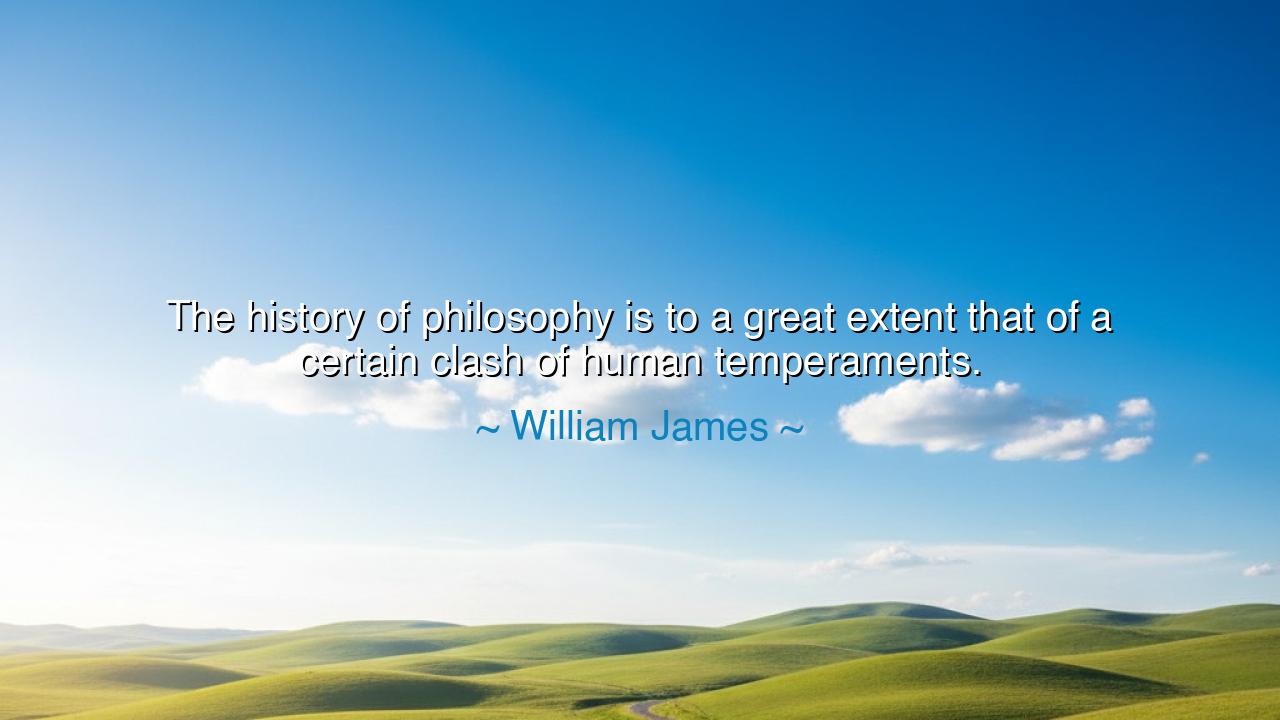
The history of philosophy is to a great extent that of a certain
The history of philosophy is to a great extent that of a certain clash of human temperaments.






“The history of philosophy is to a great extent that of a certain clash of human temperaments.” – William James
In these profound and luminous words, William James, the great American philosopher and psychologist, unveils a truth that pierces to the heart of all human thought — that behind every lofty system, every school of reason, every grand philosophy, there beats not only the mind, but the temperament of the thinker. When James says that the history of philosophy is “a clash of human temperaments,” he means that ideas do not float in a void; they are born of the human spirit itself, of its moods, passions, and ways of being in the world. Logic may shape thought, but temperament gives it life.
The ancients knew this, though they spoke of it in other tongues. When Plato dreamed of eternal forms, of perfect truth untouched by the flux of time, he revealed not only his reason but his yearning for purity and order — the temperament of the idealist. When Aristotle, his student, turned his gaze to the earth and said, “Let us study what is before us,” he showed the temperament of the realist, the lover of structure and observation. Thus, philosophy was born not as a cold debate of words, but as a meeting — and a struggle — of souls. Behind every doctrine stands a human heart, wrestling with the mystery of existence in its own way.
James himself, a man of both science and spirit, saw this truth clearly. Living in the late 19th century, he stood amid the tension between empiricism and idealism, between those who trusted only in what could be measured and those who sought the invisible meaning behind all things. He recognized that such disputes were not merely about evidence or logic; they were expressions of character. Some men, he said, are “tough-minded,” skeptical, pragmatic, unwilling to believe without proof. Others are “tender-minded,” drawn to hope, faith, and the unseen. These temperaments, eternally at odds, form the pulse of philosophical history — and, indeed, the pulse of humanity itself.
Consider, for instance, the clash between René Descartes and Blaise Pascal, two towering minds of France. Descartes, cold and rational, sought certainty through reason: Cogito, ergo sum — “I think, therefore I am.” Pascal, on the other hand, distrusted such precision; he saw in man not the mind of a god but the heart of a fragile being. “The heart has its reasons,” he said, “which reason does not know.” Their disagreement was not only intellectual; it was born of temperament — the cool order of Descartes against the trembling faith of Pascal. Both were right in their own way, and their clash gave the world a deeper understanding of what it means to be human.
Philosophy, then, is not only a dialogue between ideas, but a drama of human character. The Stoic, who preaches detachment, does so because his soul seeks peace in a world of pain. The Romantic, who exalts passion and beauty, does so because his heart refuses to bow before restraint. Each school of thought arises as a mirror to its creator’s inner struggle. In this way, James teaches us to see that truth is not delivered from heaven as a single voice, but emerges through the diversity of human experience, through the friction of souls who see the world differently.
This understanding carries a deep lesson for the seeker of wisdom. We are often tempted to believe that one philosophy must destroy another — that rationalism must silence faith, or idealism must defeat realism. But James invites us to a gentler, grander vision: that the clash of temperaments is not a flaw, but a force of creation. Just as friction ignites fire, the meeting of opposing natures refines understanding. The world needs both the dreamer and the skeptic, the builder and the critic, the poet and the mathematician. Truth is not owned by any one temperament; it is born in their dialogue.
So, my child of thought and wonder, take this teaching to heart: seek not to silence the temperament that differs from your own, but to learn from it. Recognize that behind every belief lies a human soul striving, as you do, to make sense of the vastness of life. Do not despise the philosopher whose words unsettle you; for he may be showing you the half of truth you have yet to see. The wise do not cling to one temperament, but cultivate balance — reason with imagination, faith with inquiry, courage with humility.
For in the end, as William James reminds us, the history of philosophy is the history of humanity itself — a symphony of temperaments, dissonant yet divine. And if we listen with understanding, we may hear beneath the clashing voices not the sound of conflict, but the harmony of a species forever reaching toward truth.






AAdministratorAdministrator
Welcome, honored guests. Please leave a comment, we will respond soon